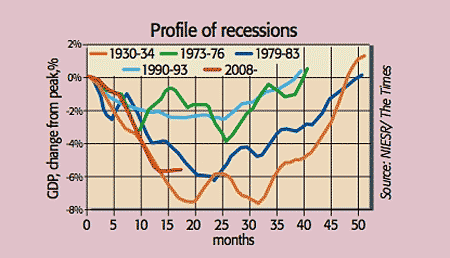
After a recession that has wiped almost 6% off Britain’s national output – the steepest slide since the 1930s – growth is rebounding, said the National Institute of Economic and Social Research. Output expanded by 0.2% in the three months to the end of August, the first quarterly rise since early 2008.
Industrial production figures helped – it is up for two months in a row for the first time in three years. Manufacturing output also grew by 0.9% in July, the best result in 19 months, thanks largely to the car scrappage scheme. Recruitment agents have even detected a marginal uptick in permanent and temporary staff appointments. So most economists are pencilling in modest growth in the third quarter.
What the commentators said
The key issue is whether the bounce in growth can be sustained. As Sean O’Grady pointed out in The Independent, what we’re seeing now is largely a reversal of the inventory effect.
As the outlook darkens, firms adjust by running down inventories rather than ordering more goods, and this has a knock-on effect throughout the economy. A small fall in demand at the retail end of a business results in a much bigger fall in demand at its suppliers as existing stock is used up. So when this process goes into reverse, as companies re-stock, overall output bounces. But this technical rebound tells us little about the real level of demand in the economy.
A recovery in consumption, which comprises 65% of the economy, is crucial to a sustainable recovery. But as Barry Knight of Smith & Williamson warns, retailers “should be prepared to have another disastrous Christmas”. Overall real household spending was down by 3.5% year-on-year in the second quarter, noted Capital Economics, while retail sales weakened in August. Pay growth continues to slide and consumers are still grappling with record debt levels. “The deleveraging process has only just begun.”
Meanwhile, the public sector will have to tackle its record post-war deficit, which will “involve enough spending cuts to add to a jobless total that is yet to reach its peak”, said Alistair Osborne in The Daily Telegraph. Worse, quantitative easing will have to be withdrawn. Throw in the ongoing credit squeeze and it’s clear why the British Chamber of Commerce has warned that “sustaining the recovery will be very challenging and the risks of a relapse are high”. The NIESR warns that it is likely to take four years for the economy to regain its 2008 size. We are in for a long slog.